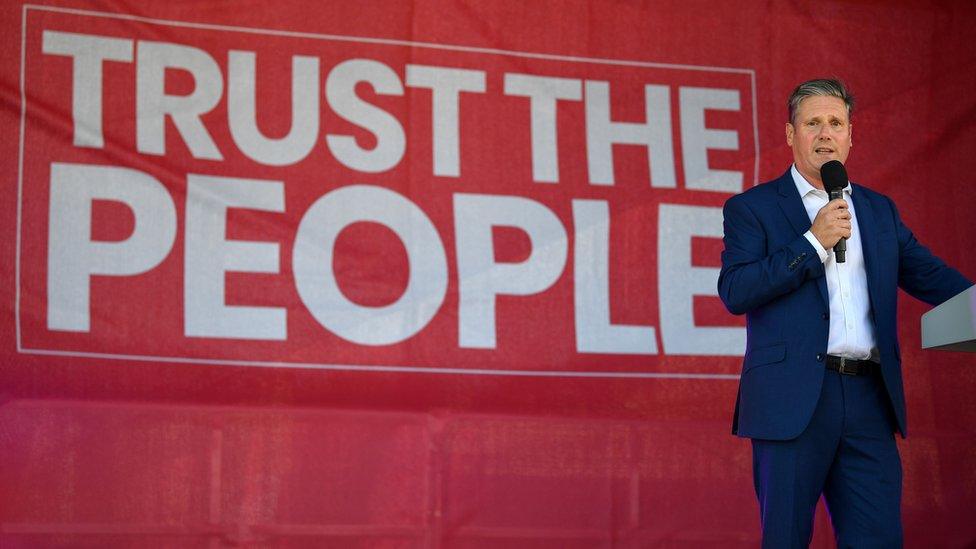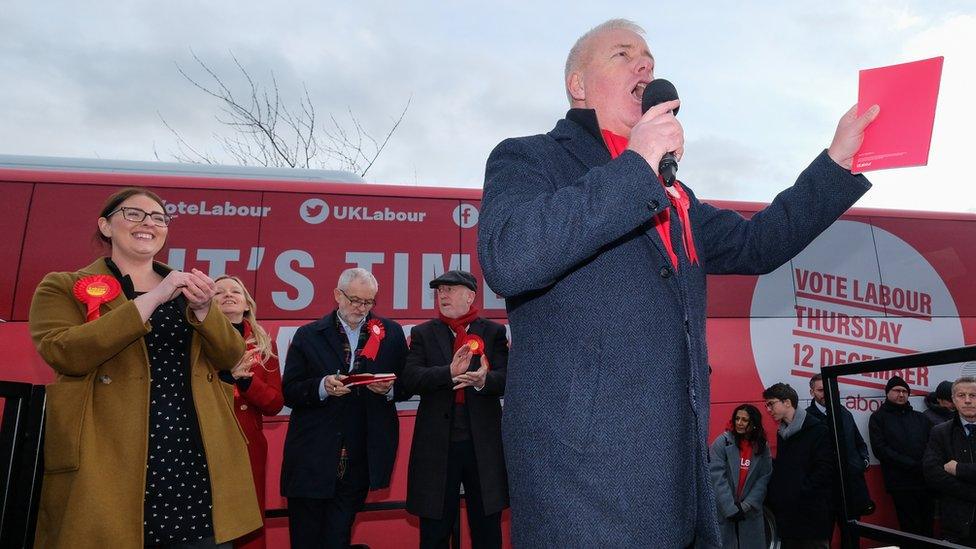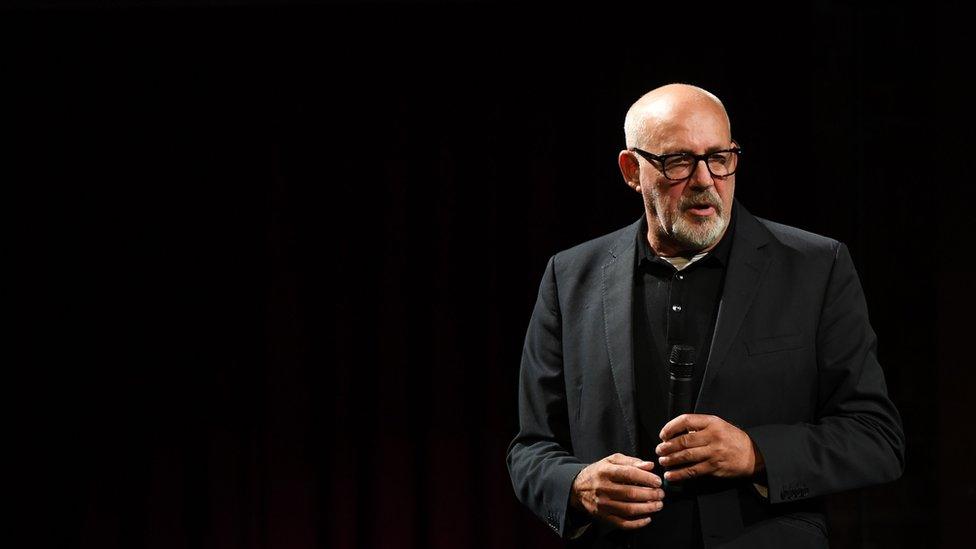Labour should apologise for Brexit policy, say key Corbyn allies
- Published

Sir Keir Starmer at a 2019 People's Vote campaign rally
Two key members of Jeremy Corbyn's shadow cabinet have called for the party to issue a '"full throated apology" for its stance on Brexit.
Ex-party chairman Ian Lavery and former elections chief Jon Trickett say backing a second referendum at last year's election destroyed trust.
In a new report, the pair call for the current leadership to apologise to both Remain and Leave voters.
Sir Keir Starmer was a leading advocate of another referendum.
The party's then Brexit spokesman was elected to replace Mr Corbyn as leader in April.
In their report, to be published later, Mr Lavery and Mr Trickett - who were both fired from the front bench by Sir Keir - say Leave and Remain voters were equally let down by the party's Brexit policy at the 2019 election.
"Leave voters were too often sneered at and Remain voters were led up the garden path with a position - of overturning the referendum result - that was never seriously achievable.
"To put this aside, Leavers and Remainers need an apology."
'Confused and contradictory'
The pair's report, entitled No Holding Back, was co-written with former MP Laura Smith, who lost Crewe and Nantwich to the Conservatives at the 2019 election. It is result of zoom conversations with Labour activists, trade unionists, voters and former voters.
And the report indeed does not hold back on what the authors think went wrong at the general election.
Mr Lavery and Mr Trickett maintain they warned their shadow cabinet colleagues of the electoral consequences of backing a second referendum.
They say: "Our argument, back in the summer of 2019, that seeking to overturn the referendum would lead to electoral disaster in the North and the Midlands was drowned out by other elements in the top ranks of the Party… we opposed the moves which were made to turn the party into a Remain-facing political unit."
But their criticisms go beyond Brexit.

Ian Lavery on the campaign trail last year
The party machine was in 2019 under the control of Jeremy Corbyn's allies - and Ian Lavery in particular played a prominent role in touring seats Labour needed to win or couldn't afford to lose.
But the report acknowledges serious mistakes.
It argues that "we did not develop a narrative that threaded our policies together and told a story about what Labour would do in power.
"… the 2019 general election was a hard lesson in how not to do policy - it was confused, contradictory in some places and was not believable to most voters."
A question of leadership
The report analyses why Labour has recovered in the polls since Sir Keir Starmer became leader,
It suggests he is picking up more support amongst former Liberal Democrats and middle-class voters in the South.
In Leave-voting areas, the report argues that there has been "a glacial pace of change among voters who are still overwhelmingly in the Tory camp. At present Sir Keir Starmer's leadership is yet to cut through."

Jon Trickett was a key member of Mr Corbyn's team
Supporters of the current Labour leader maintain that Jeremy Corbyn was mentioned on the doorsteps during last year's election as a reason for not voting Labour more often than Brexit.
And Sir Keir Starmer's personal ratings have not only been much higher than his predecessor's but have also run ahead of the prime minister's in some polls.
The report acknowledges that the Corbyn leadership and his perceived lack of patriotism was an issue at the last election.
It says that it had been a failing of the then leadership not to "re-interpret what patriotism really means in a progressive sense".
But it also claims that "media smears" meant that he was viewed less favourably by the public in 2019 than at the 2017 election.
Working class heroes
The report suggests Labour's problems go much deeper than the issues of Brexit and leadership - that for too long in predominantly working class areas, voters felt they were being taken for granted - and that Labour was seen as the establishment party.
From conversations with activists and trade unionists, the report's authors say: "People repeatedly claimed that Labour had become too southern and too middle class."
They have some recommendations, too - including, when candidates are selected, introducing quotas for those from working-class backgrounds.
Close to general elections, supporters of the party leadership - under Tony Blair and Jeremy Corbyn - have been selected with little say from local members.
"The old days of parachuting political professionals into working-class communities that they have no connection to must now end in totality," says the report.
And while Mr Lavery and Mr Trickett left the shadow cabinet at Sir Keir Starmer's request, they have what they call some "comradely advice" for him: "be bold and transformational".
Left behind
Criticism of the Starmer leadership had been fairly muted until the suspension of Jeremy Corbyn.
But the report from Jon Trickett, Ian Lavery and Laura Smith could signal a renewed willingness to speak out.
Closely-fought elections to Labour's ruling national executive conclude on Thursday, and will determine whether the Left's influence will continue to wane, or whether grassroots members want to limit Sir Keir's growing control of the party machine.